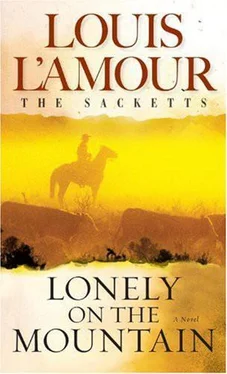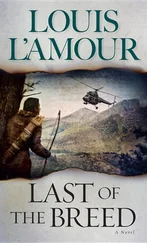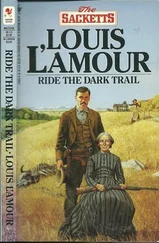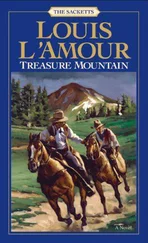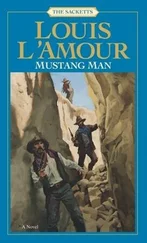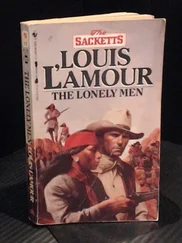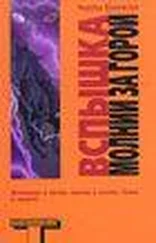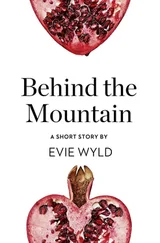We'd been keeping our eyes open for sign.
All three of us Sacketts expected it, and we knew the sort of sign one Sackett was apt to leave for another.
We found nothing.
We waded rivers, fourteen crossings in one day, and wove our way through some fir trees whose wet branches slapped us wickedly as we passed. The horses were game. They struggled through the muskeg, and finally we topped out on some reasonably solid ground.
Supplies were running low, and game was scarce. All day we had seen nothing. Ducks flew over, the V's of their flight pattern pointing south. In the morning when we awakened, there was a chill in the air.
"Wonder what become of those Injuns we had followin' us?" Cap asked one day. "I kind of miss 'em?" "Little Bear," I said, "now there was a lad." "If we don't get something to eat soon," Lin suggested, "we'll have to slaughter a beef." Now there's little goes more against the grain of a good cattleman than killing his own beef. But we'd left buffalo country behind, and we were fresh out of bear. Me, I was of no mind to tackle a grizzly unless he came hunting trouble, which they often did. A grizzly has been king in his own world for so long, he resents anybody coming around.
Only man threatens his world, and whether he avoids or fights men depends pretty much on his mood at the moment.
Down San Francisco way during the gold rush, some of the gamblers used to pit bears in cages with lions, tigers, and most anything that would fight. The grizzly almost always won in quick time.
In one particular case, a full-grown African lion lasted less than three minutes.
There were a lot of grizzlies in these mountains, but mostly they kept out of the way, not because they were afraid, but because they simply did not want to be bothered.
Orrin, who reads a lot, was reading me a piece in a magazine, Century or Atlantic, I think, about some explorers coming back from some foreign country where they'd been hunting some wild creature. They were busy hunting for a few weeks and came back saying there was no such thing. Now I've lived in panther or mountain lion country most of my life and never seen but one or two that weren't treed by hounds.
Wild animals don't want to be seen, and it's sheer accident if you see them.
We were climbing all the while, getting higher and higher, and the nights were getting colder. Then, one morning, Tyrel come to me. "Tell," he said, "there's a fringe of ice on the lake, yonder." Well, that sent a chill through me. A fringe of ice--and we had some distance to go. I wasn't sure how much.
Now we were moving up some magnificent valleys, green and lovely with great walls of mountain rising on either side; often these were sheer precipices of bare rock, or with an occasional tree growing from some rock a body could no way get to. We caught fish, and one night I got three ducks in three shots with a rifle, two sitting, one just taking off. They were needed, as grub was getting low. We had flour, salt, and the like, but we needed meat.
Every morning now there was frost. The sky was gray often enough, and one night, when there were no clouds, we saw the Northern Lights, a tremendous display brightening the whole heavens. I'd heard of it but seen it but once before, in Montana, but never like this.
It was late afternoon, and Tyrel was riding point.
It was an easy trail, across some green meadows and up along a trail through huge boulders and scattered clumps of fir. Me, I was riding on the flank when I saw Tyrel pull up short.
Well, my rifle snaked into my hands, and I saw Cap Rountree out with his, but Tyrel wasn't drawing. He was looking at a big gray boulder beside the trail.
Coming down off the slope, I rounded the head of the herd and pulled up alongside him. I started to say, "What's wrong, Tye?" and did say it before I looked past him and saw the mark on the face of the boulder.
Scratched on the face of the rock was CLINCH-S-Dease--his "Well," Orrin had come up, "he isn't dead then." "Who isn't dead?" It was Fleming.
Orrin an' Tyrel glanced at me, and I said, "We're losin' time, boys. We've got a far piece to go." Fleming stared hard at the scratching on the rock. "What's that mean?" he wondered. "It don't make no sense!" "Doesn't, does it?" Tyrel said mildly. He turned his mount. "Hustle them along, Charlie. We've a ways to go." Reluctantly, Charlie Fleming turned away.
Nettie Molrone rode up with Mary McCann. "What is it, Orrin?" "Just some scratching on a rock," he said.
"We were wondering about it, that's all." She looked at him quickly, her eyes searching his. She glanced at the rock. "It doesn't make sense. Except"--she paused, studying it--"there's a Dease River up here somewhere and a Dease Lake." "There is?" Orrin looked surprised.
"What d'you know about that?" She looked at him again, half angry.
In the morning, Charlie Fleming was gone.
Chapter XXIII
Fleming was gone, and a light rain was falling that froze as it reached the ground. We drank our coffee standing around the hissing fire in our slickers.
"I'd like to know where he went," Orrin said, "but it's not worth following him." "D'you think he made sense out of Logan's message?" "If he did," Shorty said, "he's smarter than me." "We've been passing messages around for years," Orrin said. "Started back in the feuding days, I reckon. The "Clinch S" just means he's a Clinch Mountain Sackett, which is one branch of the family, descended from old Yance. "Dease?"' simply means we should head for the Dease River, and the destination after that is in doubt." "Unless you were one of the family," Tyrel commented, "it's unlikely you'd guess." "Why'd you say he was still alive? That message might have been written days ago." "Could be, but it's scratched on there with some of that chalk rock he picked up, and had it been more'n a few days old, it would have washed away." Cap came riding in as they were mounting. "Took a look at the trail," he said. "There's a marker there. Could be by one of you boys, but that trail is one thin cow wide, and with this ice--" "Think we can make it?" "Maybe. There's no tellin' the luck of a lousy cow. Anyway, it doesn't seem like we have much choice." "It's up to me, then," I said, and rode out with old Brindle falling in behind.
When we started up the trail, old Brindle hesitated, not liking it. His horns rattled against the wall, but as I was going on, and he was used to following, he sort of fell in behind.
"Hope I don't let you down, old boy," I said. "It looks bad to me, too!" We wound steadily upward, the trail narrowing, then widening, occasionally opening to a small space of an acre or more covered with stunted trees, then narrowing again. The sleet continued to fall, and the air was cold. Far below, we could see the spearlike tops of trees, and the silver ribbon of a stream.
The trail grew steeper. At times, I had to dismount and lead my mount over the icy rocks.
At one point, I came to a bank of last year's snow, a dirty gray shelf of the stuff, which I had to break off to make a way for my horse and the following cattle.
It was slow, hard work. All day long, we climbed. There was no place to stop and rest; there was not even a place to stop.
Suddenly, the trail dipped down around a steep elbow bend, and the rock of the trail slanted toward the outer edge. Walking along the wall as tightly as possible, I led the roan around the corner.
The cattle came on. Glancing back when several hundred yards farther along, I was in time to see a steer suddenly slip and, legs flailing, plunge off into space headed for the tops of the trees five hundred feet below. Even as I looked, another fell.
Swearing softly, I plodded on, feeling for footholds around the edge. Suddenly, as it had begun, the narrow trail ended and gave out into a thick forest. Ahead, there was a meadow and beyond a stream, already icing over.
Читать дальше
